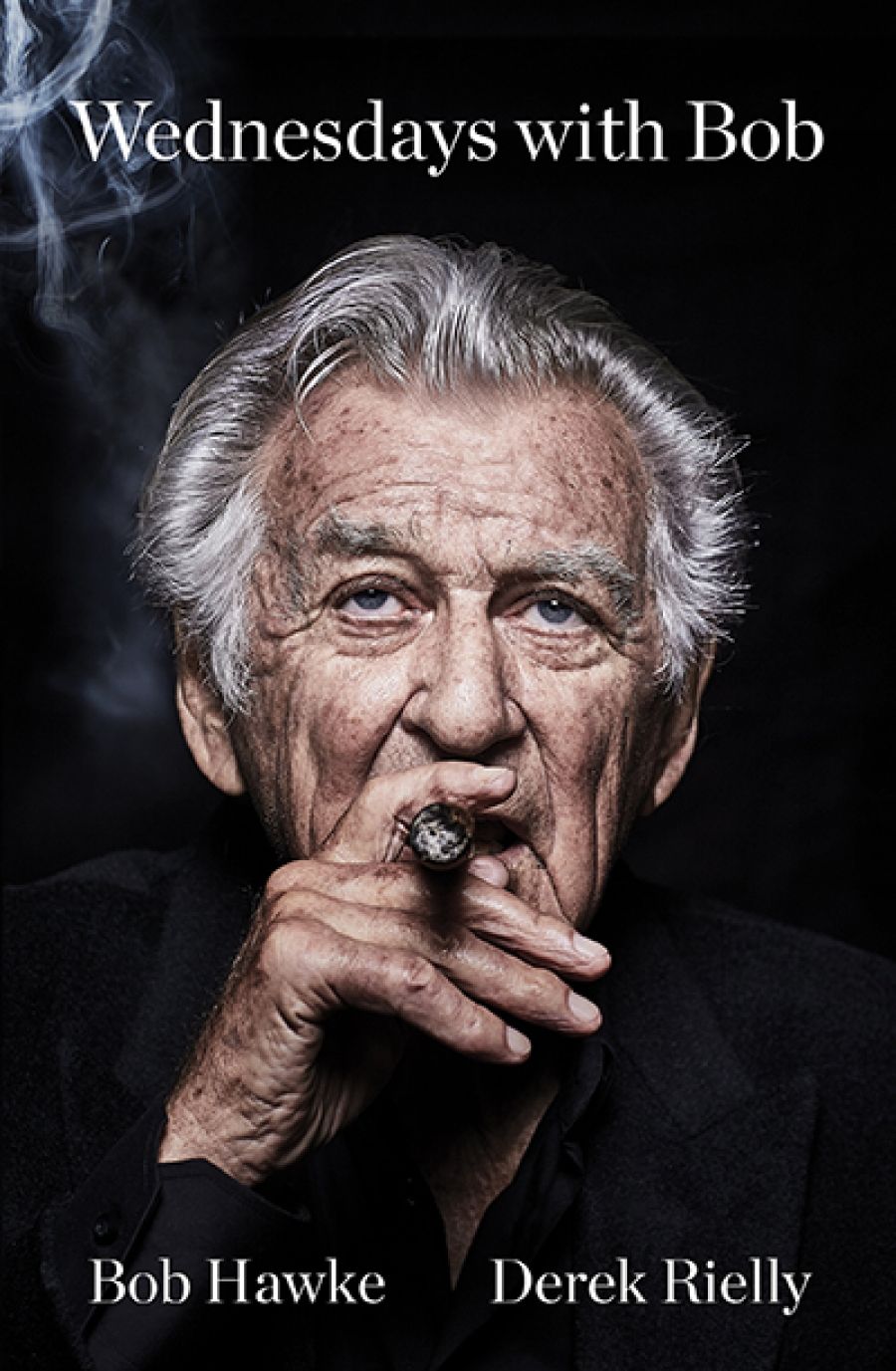
- Free Article: No
- Contents Category: Politics
- Custom Article Title: Richard Walsh reviews 'Wednesdays with Bob' by Bob Hawke and Derek Rielly
- Custom Highlight Text:
This is a book with a strange genesis. Its author, Derek Rielly, explains that he confessed to an agent one night that he’d always wanted to meet Bob Hawke. Her response was: ‘I know a publisher who loves Bob. Get me a proposal.’ In order to obtain Bob’s cooperation, Rielly had first to win over Blanche d’Alpuget and ...
- Book 1 Title: Wednesdays with Bob
- Book 1 Biblio: Macmillan, $29.99 hb, 289 pp, 9781760554262
David Rielly was born in 1967, in Perth; his father was a pro wrestler and his mother a diplomat (a mating almost as unusual as the spelling of their surname). He is best known as a surfing journalist. He seems to aspire to step into the formidable boots vacated by the late Bob Ellis; he writes vividly and is unafraid to put himself front and centre in his narrative.
Rielly would seem ideally placed to have a blokey chat with Hawkie, while ticking off his bucket list of hot topics. As if to confirm this, at one of their early interview sessions the ex-PM needs to have a leak but, instead of momentarily retiring, like any ordinary mortal, he instead pees off his balcony while maintaining the momentum of his yarn-spinning and boasts to his interrogator that his sphincter suffers none of the failings often associated with eighty-six-year-olds.
If you admire a PM who feels compelled to piss in front of a journo, who is clearly a narcissist and is such an egotist that he seems to have no understanding of the collateral damage he inflicted on his first wife and the children she bore him, who chooses Richo and Singo as lifelong friends, this is the book for you. For the rest of us, this is a book that is only fitfully insightful. There are a number of meandering conversations with Bob, but only one of these could be described as spellbinding. To make up for this lack, Rielly goes hunting for other people to talk to, and here he hits pay dirt. His conversations with Kim Beazley and Gareth Evans are pure gold. Even his conversation with John Howard is more illuminating than his chats with Bob.
Kim Beazley has no doubt that Hawke was ‘our best peacetime prime minister’. British political theorist Walter Bagehot once wrote that a great statesman was ‘a man of commonplace opinions and uncommon administrative abilities’. As Beazley observes, ‘That was Bob.’ He recalls admiringly the economic reforms of the Hawke–Keating governments and Bob’s grasp of the economic truth that the Australian market was too small to survive in an ultra-protected cocoon. This assessment was not publicly popular, but Bob ‘gets out there and he argues his convictions. He always did the Australian public the honour of assuming that they had intelligence. He was the quintessential democrat as a political figure.’
 Blanche D'Alpuget and Bob Hawke (photograph by Eva Rinaldi via Wikimedia Commons)So does this mean that Hawke can take more credit for those important reforms than Keating? Here is Gareth Evans’s verdict: ‘Hawke is right that some of the early big reforms – the floating of the dollar and all that sort of stuff, which Keating has tended in retrospect to say me me me me me – they were probably more Hawke than Keating. Hawke was a good economist and had a good sense of what needed to be done.’
Blanche D'Alpuget and Bob Hawke (photograph by Eva Rinaldi via Wikimedia Commons)So does this mean that Hawke can take more credit for those important reforms than Keating? Here is Gareth Evans’s verdict: ‘Hawke is right that some of the early big reforms – the floating of the dollar and all that sort of stuff, which Keating has tended in retrospect to say me me me me me – they were probably more Hawke than Keating. Hawke was a good economist and had a good sense of what needed to be done.’
In summing up Hawke as a human being, Evans says he was highly intelligent ‘but not an intellectual in any way, shape or form, and with no particular interest in the arts’. He reckons Bob read one book a year at most; but once, when he consumed a book on the eighteenth-century British statesman Robert Walpole, ‘we heard about bloody Robert Walpole about three times a week for the next two years’.
Rielly’s narrative is punctuated by compelling stories – like the time Hawkie and Singo won more than a million dollars when their horse, Belle du Jour, won the Golden Slipper in 2000; or, perhaps of more significance, Hawke fighting the good fight against apartheid and against mining in Antarctica. But the Silver Bodgie’s response to contemporary political events is not particularly penetrating, although he has some interesting ideas, however impractical. He believes that ‘The Chinese are not a hegemonic power. They have not been historically and they’re not now. They don’t make any claims to the South China Sea.’ Everything could be amicably sorted out if the disputing countries could sit down together and develop ‘a regime for joint development’ (surely only a man who has spent much of the last few decades acting as a friend of China could be this naïve). He also believes that China has a role to play in guaranteeing peace between Israel and Palestine. He is a long-time advocate of burying uranium waste in remote parts of Australia and advances strong arguments in favour of this as a future national money-spinner.
David Rielly has served up a curate’s egg as some kind of dog’s breakfast. But, for Hawkophiles, it will be a must read. For others, there may well be enough gems sprinkled throughout to make the hagiography tolerable.


Comments powered by CComment